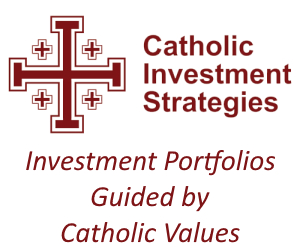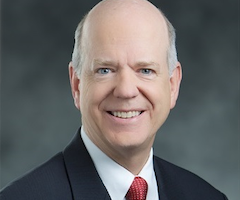Column: The Catholic Investor
As we rapidly approach the finish line of this year’s presidential election, emotions run high and pundits weigh in on how its outcome may affect the stock market.
Interestingly, history is unclear as to whether the stock market (as measured by the S&P 500 Index) cares which party ultimately holds the presidency. 
Republican or Democrat, the stock market seems to follow an upward trend reflecting the overall growth of the U.S. economy. From President Eisenhower (inauguration date January 20, 1953) through President Biden (inauguration date January 20, 2021), the inflation adjusted annual return to the S&P 500 has been approximately 7%. When looking at inflation adjusted annual average returns by presidential party, Democrats hold the advantage. However, when median returns are used, the advantage switches to Republicans. (Sidenote: the absolute best inflation adjusted annual return belongs to President Clinton at 14.35%. He is followed by Presidents Eisenhower and Trump with returns of 13.85% and 13.67%, respectively.)
So, if the market is reasonably ambivalent about party affiliation of the President, on what basis would a Catholic investor make a decision?
As noted ofttimes before, we make our investment decisions based on the guidance provided by the U.S. Conference of Catholic Bishops (USCCB) in their Socially Responsible Investment Guidelines.
Unfortunately, there are only a few of the proscribed activities that the candidates disagree on.
Harris is unabashedly pro-abortion without limits while Trump has said that, with the Supreme Court’s overturning of Roe v. Wade, decisions on abortion now reside with the citizens of each state.
Another point of difference is in so-called “gender-affirming” care for children. Harris is supportive of that while Trump is opposed. Harris also supports the Equality Act, which the USCCB has said “discriminates against people of faith precisely because of those beliefs. In the process, the Equality Act codifies the new ideology of “gender” in federal law, dismissing sexual difference and falsely presenting “gender” as only a social construct.” The first Trump administration, in the words of the ACLU, “vehemently opposed the Equality Act”.
While the available points of comparison are few, they do seem clear.
Let’s take a look at the election from a different angle
When we work with a potential client, we make many financial projections. Important among those are projections on tax rates and rates of return. Higher tax rates, of course, mean lower after-tax returns, which are the only kind an investor can actually spend.
Harris is talking about higher taxes while Trump promotes lower tax rates. (Trump actually did lower tax rates across the board during his first term as president.)
Furthermore, asset allocations and future return projections rest on an underlying assumption that American industry will continue in robust health, much as it has in the past.
Experience has shown that countries that embrace socialist policies under-perform and, in many cases, end up in collapse. A variety of sources label Harris as a socialist and her proposals for price controls, debt cancellation and consumer subsidies don’t contradict that label.
Harris has also said, “I believe an active partnership between government and the private sector is one of the most effective ways to fully unlock economic opportunity.”
Here is a response from the Mises Institute’s Mises Wire:
“In other words, she is promising that a Harris regime would not overtly seize the means of production from their current owners as Communist revolutionaries would, but instead would force those owners to accept the Harris administration as their active “partner” in making decisions about production. Evidently, she conceives of “opportunity,” not as
something that capitalists are naturally incentivized to pursue by seeking profits and avoiding losses in the context of peacefully acquired ownership rights and voluntary market exchanges, but rather as something that has to be incentivized by compulsory obedience to bureaucratic orders emanating from a central planning office under her allegedly beneficent leadership.
Of course, it is false advertising to label oneself a “capitalist” when one would compel capitalists to hand over effective control over their businesses to their new “partner” from the government.”
Trump, of course, is an unabashed capitalist.
Without a healthy economy, investment returns will be anemic at best.
I hope this brief discussion has been informative. Consider carefully and vote wisely.
RELATED RESOURCES:
- Catholic Investment Strategies
- Socially Responsible Investment Guidelines, by the U.S. Conference of Catholic Bishops
- VOTER GUIDES (excellent)
Thomas "Tom" Carroll, CFA, is the president of Catholic Investment Strategies, a position in which he has passionately enjoyed serving since 2012. Prior to this position,... MORE »




You must be logged in to post a comment.